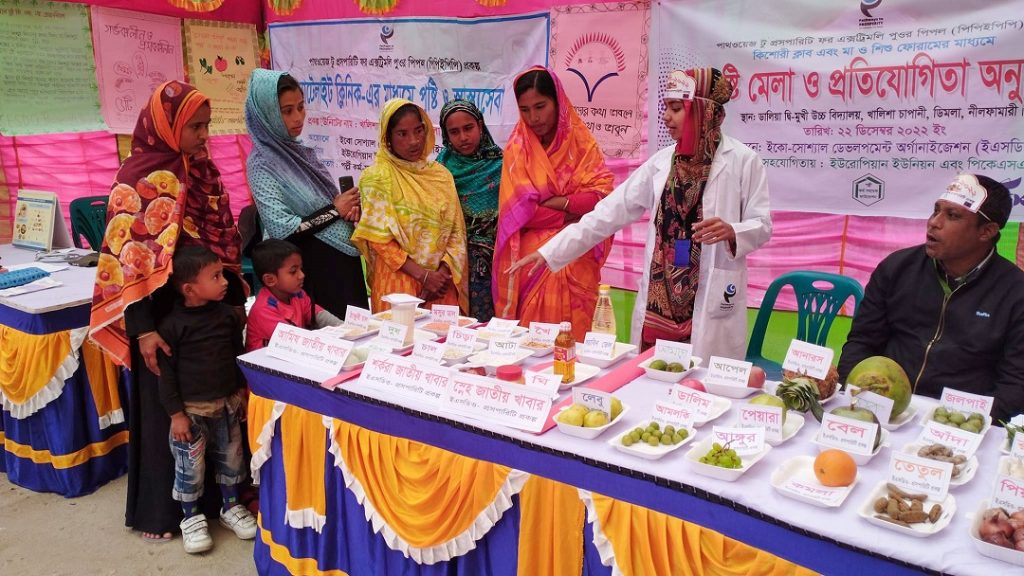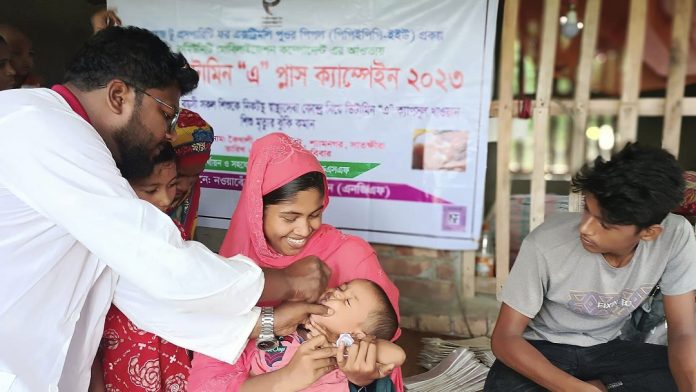Every year, malnutrition and related diseases and infections stifle the development of extremely poor people. In addition, early mortality and increased health cost, combined with income loss, force them into lifelong financial hardships and trap them into intergenerational poverty cycle.
Pathways to Prosperity for Extremely Poor People-European Union (PPEPP-EU) project tackles this challenge by delivering nutrition-specific, nutrition-sensitive and linkage-building services with existing government health and nutrition facilities. The project’s nutrition-specific services cover all the 16 DNIs (direct nutrition interventions) promoted by the Bangladesh government. Over 200,000 extremely poor households from 145 unions of 12 districts receive these services under the project. The project creates awareness and ensures services for families, focusing on mothers, children and adolescents in the seven following domains under the 16 DNIs.
Infant and Young Child Feeding (IYCF): Tawchan, the 15-month old son of Purobi Begum (29) from Itna, Kishoreganj, was first identified as an underweight child by PPEPP-EU’s Community Nutrition and Health Promoter (CNHP) during a regular household visit. She suggested that Purobi provide Tawchan with nutritious complementary food besides regular breastfeeding and oriented the mother with ideal food selection and cooking process. The mother followed the instructions accordingly, and subsequent routine growth monitoring by our CNHP shows that Tawchan’s weight and growth improved.
Like Purobi, all expecting and lactating mothers under the project are sensitised on good health and nutrition practices, especially during antenatal and postnatal periods to break the cycle of intergenerational cycle of malnutrition. This is done by ensuring key messages of IYCF, such as early initiation of breastfeeding, exclusive breastfeeding, age-specific complementary food intake and continuation of breastfeeding up to two years along with complementary feeding.
Hygiene: The project promotes the importance of hygiene, safe drinking water, and sanitary latrine usage during household visits as well as during sessions at various clubs and forums. As a result, household members wash their hands at five critical times using “Tipitap,” a low-cost technique of washing hands using soap water stored in a plastic bottle. Project participants are also sensitised on personal hygiene such as cutting nails, brushing teeth, and using sandals in the toilet to prevent certain vector-borne diseases.
Micronutrient Supplementation: Even during her second pregnancy, Tania (29), a member from Amkhola Union, Patuakhali had no idea about iron-folic acid and calcium supplements before attending the ‘Mother and Child’ forum session. Iron-folic acid is crucial for the fetus’s neural development, while calcium supplements are essential for bone development. Our CNHPs referred Tania to the nearby community clinic, contacted the CHCP (Community Health Care Promoter) and ensured that she received these supplements and other services. She eventually gave birth to a healthy child.
Sharing her experience, Tania said, “This time, I made it through a normal delivery. But it would not have been possible without the support [from the project] at the crucial stage of my pregnancy.”
To ensure complication-free childbirth, the project creates awareness on ANC and PNC services. The project also refers under-five children and adolescent girls to local healthcare facilities and different national campaigns for supplements such as Vitamin A, zinc and iron-folic acid tablets.
Deworming: Our CNHPs and ATOs (Assistant Technical Officers) disseminate messages on deworming children under five, refer them to the nearest healthcare facilities such as Community Clinic and Upazila Health and Family Welfare Centre and follow up with parents to ensure intake of deworming tablets as per the guideline.
Consumption of nutrient-rich fortified food: The project aims to establish a year-round source of nutritious food for family members by engaging the households with nutrition-sensitive income-generating activities such as poultry and duck rearing, small-scale aquaculture and homestead vegetable cultivation.
Besides, field staff conduct household-level dietary counselling, raise awareness on using iodised salt and Vitamin A fortified cooking oil and demonstrate the ideal food cooking process to ensure nutrient-rich fortified food intake for different age groups. The project also organises Nutrition Fairs where community mothers participate in cooking contests. These fairs are aimed at promoting ideal cooking practices among the wider community members.

Management of Acute Malnutrition: Children under five years with acute malnutrition, such as SAM (Severe Acute Malnutrition) and MAM (Moderate Acute Malnutrition), are referred to the nearest Upazila Health Complex (UHC) to receive treatment according to the national protocol.
In the case of Samia Sultana (two years old), who was identified as a SAM child but did not require in-patient treatment from UHC, the project delivered a two-month long high-value Food Package to improve her physical growth. Our nutrition staff demonstrate the cooking process of these food items (Pushti Khichuri and Pushti Halua) following the Community Management of Acute Malnutrition (CMAM) guidelines. They also sensitise the mothers about their daily meals during IYCF sessions held at Mother and Child Forums and Prosperity Village Committees.
“I am happy to see my daughter healthy now. This happened as we received a food package along with regular counselling,” Samia’s mother Rubaiya Khatun from Shovnali union of Satkhira said.
Maternal Nutrition: Our CNHPs and ATOs disseminate helpful messages among pregnant and lactating women (PLW) using flipcharts and other communications materials on the importance of iron-folic acid and calcium supplements, nutritious food, ANC/PNC checkups, pre- and post-delivery complications, exclusive breastfeeding and adequate sleep and rest. Besides, husbands, in-laws and parents of PLWs are sensitised through separate sessions about sharing household chores and the importance of eliminating the existing prejudices around pregnant and lactating mothers.


